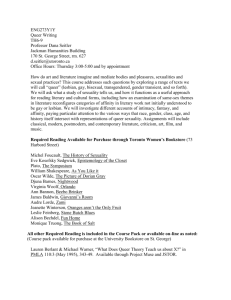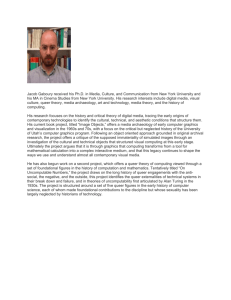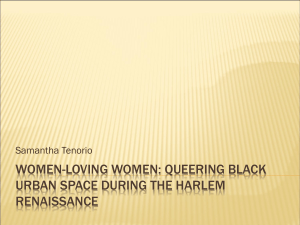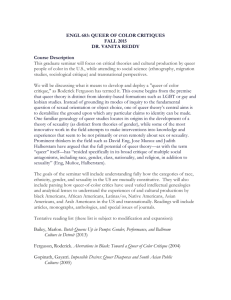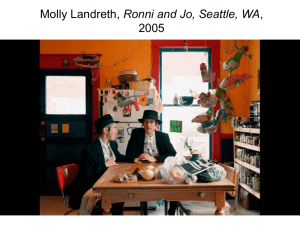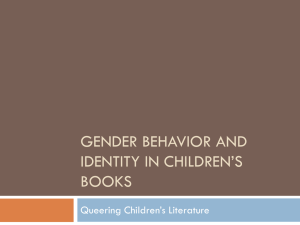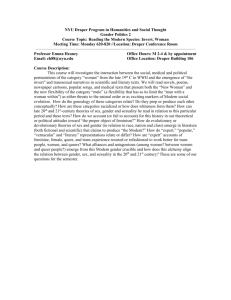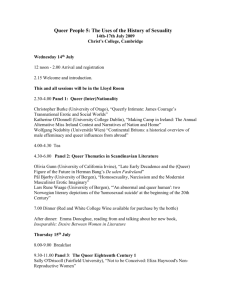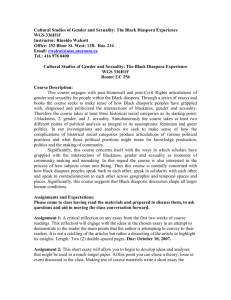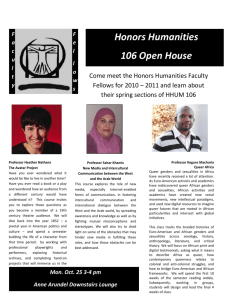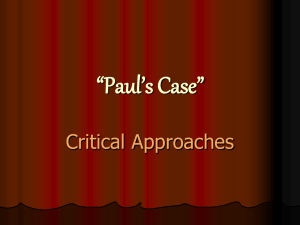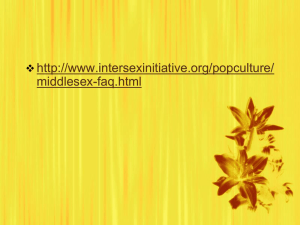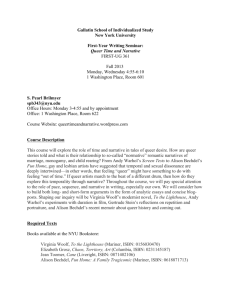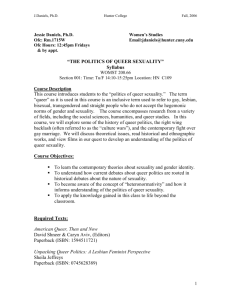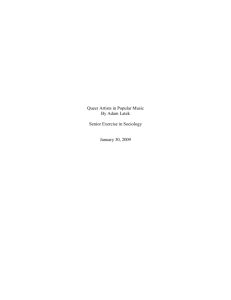October
advertisement
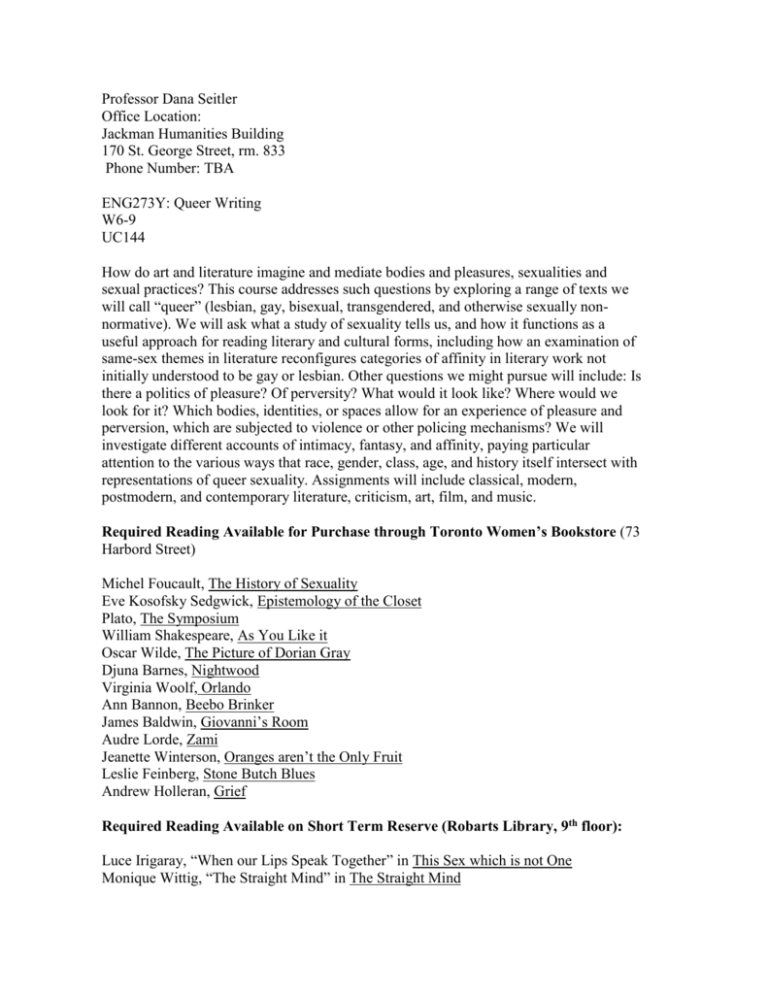
Professor Dana Seitler Office Location: Jackman Humanities Building 170 St. George Street, rm. 833 Phone Number: TBA ENG273Y: Queer Writing W6-9 UC144 How do art and literature imagine and mediate bodies and pleasures, sexualities and sexual practices? This course addresses such questions by exploring a range of texts we will call “queer” (lesbian, gay, bisexual, transgendered, and otherwise sexually nonnormative). We will ask what a study of sexuality tells us, and how it functions as a useful approach for reading literary and cultural forms, including how an examination of same-sex themes in literature reconfigures categories of affinity in literary work not initially understood to be gay or lesbian. Other questions we might pursue will include: Is there a politics of pleasure? Of perversity? What would it look like? Where would we look for it? Which bodies, identities, or spaces allow for an experience of pleasure and perversion, which are subjected to violence or other policing mechanisms? We will investigate different accounts of intimacy, fantasy, and affinity, paying particular attention to the various ways that race, gender, class, age, and history itself intersect with representations of queer sexuality. Assignments will include classical, modern, postmodern, and contemporary literature, criticism, art, film, and music. Required Reading Available for Purchase through Toronto Women’s Bookstore (73 Harbord Street) Michel Foucault, The History of Sexuality Eve Kosofsky Sedgwick, Epistemology of the Closet Plato, The Symposium William Shakespeare, As You Like it Oscar Wilde, The Picture of Dorian Gray Djuna Barnes, Nightwood Virginia Woolf, Orlando Ann Bannon, Beebo Brinker James Baldwin, Giovanni’s Room Audre Lorde, Zami Jeanette Winterson, Oranges aren’t the Only Fruit Leslie Feinberg, Stone Butch Blues Andrew Holleran, Grief Required Reading Available on Short Term Reserve (Robarts Library, 9th floor): Luce Irigaray, “When our Lips Speak Together” in This Sex which is not One Monique Wittig, “The Straight Mind” in The Straight Mind Lauren Berlant & Michael Warner, “What Does Queer Theory Teach us about X?” in PMLA 110:3 (May 1995), 343-49. Available through Project Muse and JSTOR. Lauren Berlant and Michael Warner, “Sex in Public” in Critical Inquiry 24:2 (Winter 1998), 547-66. Available through Project Muse and JSTOR. Judith Butler, “Critically Queer” in Bodies that Matter and “Imitation and Gender Insubordination” in The Lesbian and Gay Studies Reader, eds. Henry Abelove, Michèle Aina Barale and David M. Halperin. Sappho, If Not, Winter, trans. Ann Carson (New York: Knopf, 2002). Poems: 1, 23, 47, 48, and 94. Henry James, “The Beast in the Jungle” on short term reserve and www.projectgutenberg.org Stephen Crane, “The Bride Comes to Yellow Sky” on short term and http://etext.virginia.edu/toc/modeng/public/CraBrid.html Sarah Orne Jewett, “The Queen’s Twin” Gertrude Stein, “Susie Asado”; “Preciosilla”; “Miss Fur and Miss Skeene” Douglas Crimp, “Mourning and Militancy” in October 51 (Winter 1989), 3-18. (JSTOR) Douglas Crimp, “How to have Promiscuity in an Epidemic” in October 43 (Winter 1987), 237-71. (JSTOR). Also in AIDS: Cultural Analysis/Cultural Activism (1988). Cathy Cohen, “Punks, Bulldaggers, and Welfare Queens: The Radical Potential of Queer Politics?” in GLQ 3:4 (1997), 437-85. (Project Muse) Amy Villarejo, “Tarrying with the Normative: Queer Theory and Black History” in Social Text 23 (Fall-Winter 2005), 69-84. (available on-line through Electronic Resources) Jose Muñoz, “Pedro Zamora’s Real World of Counterpublicity” in Disidentifcations Roderick Ferguson, “Toward a Queer of Color Critique” in Aberrations in Black Willa Cather, “Paul’s Case” (short term and on-line through classicshorts.com) Sandy Stone, “The Empire Strikes Back: A Posttransexual Manifesto” in The Visible Woman, eds. Paula Treichler, et, al. Method of Evaluation: Two essays, 6-8 pgs. (25% each); Two term tests (for a total of 35%); class participation (15%). Class participation is not exclusively evaluated on attendance. Truly active participation and engagement (for example: asking questions and speaking in class, demonstrating knowledge of the texts, and our continuing conversations) will also be considered. Penalty for late essays: Drop one letter grade (and its numeric equivalent) per week with no extension beyond two weeks. For instance, if you started with an "A" (85), it would become an A- (82) after two days, B+ (79) after four days, and a B (75) after seven. General Course Expectations: I expect you to attend every class lecture. You should be prepared to discuss the texts assigned for the class day, having read and thought deeply about the material. A successful, in-depth, and sophisticated exploration of our inquiry depends upon your active involvement in formulating thoughtful responses to and interrogations of the course materials. To best facilitate our work together, please come to class on time and prepared to discuss all assigned material. Although convenient, I would appreciate that if you choose to use technology in the classroom, such as computers, you must respect the following requests: Please do not use your iPods, your MP3 Players, or any musical recording device while class is in session. No wireless operations such as accessing the internet, your email, or instant messaging services. Please do not operate cell phones/Blackberrys/Treos and the like at any point. Please do not text message. The recording of any of the classroom lectures/discussions requires that you get permission from me first, and in some cases, the entire class (because not everyone wants her or his comments to be recorded). You are never allowed to "video" or "digitally" record the class proceedings on camcorders, digital cameras of any kind, or cell phones. Any use of technology during class tests is utterly prohibited, and if you need to use a computer to write your term tests, you will have to arrange that option through Accessibility Services. Reading Schedule: (subject to change) First Term September 12: Introduction to Course 19: Plato, Sappho, and Hedwig (in class film clips from Hedwig and the Angry Inch) 26: Butler, “Imitation and Gender Insubordination” and “Critically Queer” Films (in class): Sadie Benning, “It wasn’t Love” and Kiki and Herb, “Total Eclipse of the Heart” October 3: Shakespeare, As You Like It 10: Eve Sedgwick, “Axiomatic;” Wilde, Dorian Gray 17: Sedgwick, “Epistemology of the Closet;” Dorian Gray (cont.) 24: Foucault, History of Sexuality (Part One); James, “The Beast in the Jungle” 31: Foucault, History of Sexuality (Part Two and Five); Crane “The Bride Comes to Yellow Sky”; Jewett, “The Queen’s Twin” November 7: Gertrude Stein, “Miss Furr and Miss Skeene”; “Susie Asado”; and “Preciosilla”; begin reading Orlando First Essay Due 14: Woolf, Orlando; Monique Wittig, “The Straight Mind” 21: Djuna Barnes, Nightwood; Irigaray, “When our Lips Speak Together” December 28: Barnes, Nightwood (cont.) 5: Term Test Second Term January 9: Ann Bannon, Beebo Brinker 16: Willa Cather, “Paul’s Case”; Berlant/Warner “What Does Queer Theory Teach us About X?” 23: James Baldwin, Giovanni’s Room; Berlant/Warner, “Sex in Public” 30: Baldwin, Giovanni’s Room (cont.) February 6: Audre Lorde, Zami; Amy Villarejo, “Tarrying with the Normative: Queer Theory and Black History” 13: Zami (cont.) 20: Reading Week, No Class 27: Film (in class): Marlon Riggs, Tongues Untied; Roderick Ferguson, “Toward a Queer of Color Critique”; Jose Muñoz, “Pedro Zamora’s Real World Counterpublicity” March 6: Feinberg, Stone Butch Blues; Sandy Stone, “The Empire Strikes Back: A Posttransexual Manifesto” optional: Cathy Cohen, “Punks, Bulldaggers, and Welfare Queens” 13: Winterson, Oranges aren’t the Only Fruit; 20: Oranges (cont.) Second Essay Due 27: Holleran, Grief; Crimp, “How to Have Promiscuity in an Epidemic” and “Mourning and Militancy” April 3: Holleran, Grief (cont.) 10: Term Test
